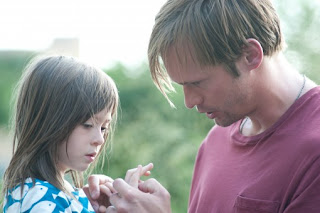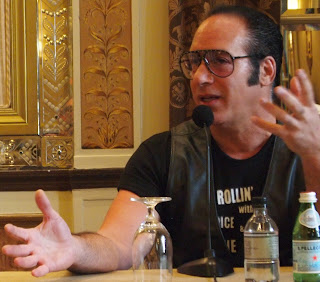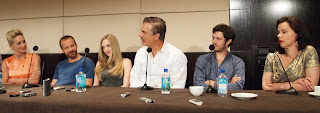Joe Swanberg on Drinking Buddies
(from Sag Harbor Online 8/23/13)
 Joe Swanberg Photo: DP
Joe Swanberg Photo: DP
Indie favorite Joe Swanberg began his directing career with
Kissing on the Mouth in 2006 and since then has been a directorial machine,
churning out more than twenty movies, all improvised, all with lots of
chatter—which is why he is revered by fans of mumblecore cinema--all personal,
all starring unknown amateurs (including himself and, for a time, his discovery
Greta Gerwig), all done on miniscule budgets, all about young middle-class
people in troubled relationships, and some with graphic sex. A quote by him (highlighted on his IMDB page)
indicates his need to slow down: “I
realized that because I'd been producing so much work, I hadn't changed enough
as a person between projects. At that point I couldn't make another movie even
if I'd wanted to, because I hadn't had a life for so long.” Swanberg is now thirty-two, with a wife, kid,
and new perspective, and though he is still prolific (two more films are
heading our way), he has slowed down a bit.
He has also decided that it’s time to make movies for a larger target
audience, which means casting actors people have actually heard of. His new film, Drinking Buddies, which opens in New York City on Friday, is
already getting him media attention than he’s never experienced. And his four leads—Olivia Wilde, Jake
Johnson, Anna Kendrick, and Ron Livingston—are telling everyone they are
thankful they got to play interesting characters unlike anything offered to
them in the past—and that they’d be pleased to work with Swanberg again. Here’s the premise: Best buddies, drinking
buddies, Kate (Olivia Wilde) and Luke
(Jake Johnson) work at a Chicago brewery. They flirt endlessly at work and at bars after
work. They deny their mutual attraction
because they are in relationships. But
Luke has more fun with Kate than his fiancée of six years, Jill (Anna
Kendrick), and Kate seems more comfortable with Luke than her music producer
boyfriend Chris (Ron Livingston). Everything
becomes trickier when the two couples go away together and Jill and Chris
kiss. Things go in strange directions
and Swanberg even shows up in a cameo to grapple with Luke. On Monday, I had the following conversation
with the director about what may be his breakthrough film. His photo was taken with his cellphone!
Danny Peary: Perhaps it’s because of the cast, but people
are talking about Drinking Buddies as
a semi-mainstream movie, which would be something new for you.
Joe Swamberg: I hope it is. DP: Your other films were improvised. Was there a script for this?
JS: There was actually about 45 pages of outline. Just no dialogue.
DP: And do you still not hold auditions?
JS: I don’t. I don’t know what I could learn about people when there’s not a script to audition with. It doesn’t seem like a great environment to figure out whether I can work with somebody. It’s always been either writing parts specifically for people or just sort of having a conversation approach to casting.
DP: For your earlier films, were your fans more male than female?
JS: Hard to tell. I think it shifts with each movie, but I’d
say that right now, most of my fans are hardcore cinephiles. That tends to be,
at least in my mind, more of a male audience. But I think with Drinking Buddies it’s shifting quite a
bit to women.
DP: Would people who have seen your earlier movies and don’t
know you directed Drinking Buddies,
be able to tell you made it?
JS: I sense that they
would. I think that my concerns and the things that I’m fascinated by are still
the same. I’m still interested in how we do or don’t communicate with each
other, especially in the context of relationships; I’m still interested in the
temptations that we deal with when we’re in committed relationships. I think these
are things that have been central to all my movies. This one is bigger, and to
me, feels bigger, but my wife watched the first cut and said, “Wow, it still
feels like just one of your movies.” So I think that I can’t help being myself.
DP: But what about stylistically?
JS: We shot it pretty much the same.
DP: To me, it looks more formal.
JS: Yeah, there’s quite a bit more set-up involved, but I
attempted, performance-wise, to keep the actors pretty free and loose. The
cinematographer I worked with was very fluid and quick-moving with them. So it felt like the same process as always,
just with some more infrastructure.
DP: I think fans of yours who watched all your films about
twentysomethings dealing with relationships can view Drinking Buddies in regard to your aging. You’ve gotten older than
the characters in your previous films and I think this film is in a way about
that. Does this film reflect that you’ve aged?
JS: Certainly. And I have a kid now. Those things are really on my mind a
lot. The stakes naturally get higher as
the characters in my movies leave their twenties and enter their thirties. I think by default the conversations that
they’re having feel more dramatic, in that sense.
DP: Were you thinking that your characters were too young to
make commitments but not anymore?
JS: Here’s how I feel about it. America allows everybody an extended
adolescence now. This country’s not going to force anybody to grow up. If
you’re a middle-class white person, you especially don’t have to grow up. I’ve been married for six years, I have a son
who’s almost three, but the characters I’ve been putting in my movies are not
at the life place that I’m at. I want
them to be a little more representative of what I’m seeing--which is people waiting until their early thirties to even
have the marriage conversation and until their mid-thirties to talk about kids.
I feel I’m a couple years ahead of a lot of my friends in terms of that stuff,
but I want the movies to still be reflective of what I’m seeing around me.
DP: You could have cast twenty-year-olds in the film but I
think it’s telling that you cast older actors on purpose.
JS: On purpose, yes. I’ve always hoped that my movies grow
up with me. If I’m still making movies
when I’m 80, knock on wood, I hope that my central cast is also full of
80-year-olds.
DP: For this, four well-known actors, Olivia Wilde, Jake
Johnson, Anna Kendrick and Ron Livingston, decided to work with you. Had they
all seen your previous films?
JS: I don’t know if they did. I actually don’t know if any
of the four had seen one of my movies before I got in touch with them. I know
that Ron watched some in the time between my first talking to him and his doing
the film. I still don’t know if Jake or Anna have seen any of my movies. Olivia
did watch a lot of my stuff in preparation for this.
DP: On television, in New
Girl, Jake Johnson’s great at making written dialogue sound improvised. But
in this he makes it seem as if it could have been written.
JS: Everything’s improvised that he did, as it was with the
others. But he is great. The thing that I took away from my initial meeting
with him and then from working with him is that he has such a rich, full
personality that he lights up the camera and the room he’s in. He’s a great
actor who wasn’t a kid actor. He had a whole life outside of the industry, and
he’s in his thirties and is only now coming into his own and getting a lot of
attention. He’s really exciting to me
because he wasn’t shaped by Hollywood and taught the right way to perform, or
any of that. He’s just himself.
DP: Did the other three turn into your type of actors?
JS: All of them turned out to be my type of actors. It was a
wild guess going in, but now I hope all
four of them will become regular players for me and I can keep putting them in
things. I’ve already worked again with Anna Kendrick [on Happy Christmas, due out in 2014].
She is one of the most talented people I’ve ever had the pleasure of
working with.
DP: You’re known as one of the pioneers of mumblecore, which
signifies that your characters talk a lot. There is a lot of talk in this film,
but I noticed that you silence your characters at key times.
JS: Well, silence is big for me. The most directing I do on
set is reminding actors that they don’t have to talk all the time. When a
camera and lights are pointed at them, I think that there’s a natural instinct
for actors to be on, and fill that space. But in regular conversation, there’s
quite a bit of listening that happens, and there’s quite a bit of thinking that
happens in between something being said to you and your response to it--at
least in my conversations. And so I want that silence in there, and often very
dramatically. It’s often much more dramatic to say nothing in movies, unlike on
radio, where you talk or it’s dead air.
Film, because it’s a visual medium, can convey a lot when someone’s not
saying anything.
DP: Are you talking about silence by the actors themselves
or the characters? Because Jake Johnson
just talks and talks and talks, so when he doesn’t talk, as in the last
scene, there’s something going on and we pay attention.
JS: There’s weight to the silence, yes.
DP: In addition to making the silence relevant, you use
character placement thematically. There is a lot of hugging, handshaking,
characters touching, and characters placed in the frame almost on top of each
other.
JS: It’s negative space, but it’s all in proportion to the
performance. And the spacing is a big one for me, because it’s such a big part
of how we work and relate to each other. The physical actions, what they do in
the film, take on significance in terms of their proximity. A lot of this is
about attempting to capture what I remember experiencing from my own
flirtations--eye contact that lingers a little longer than it should, or the
strategic placement of a hand on somebody’s shoulder, or any of those
complicated signals that at the time feel loaded with meaning. I tried to
infuse that into these characters’ body language, rather than it being
something that is said aloud.
DP: Again it’s the age thing: You’re older now, so are you
wiser when looking back on such things?
JS: I hope so. At this point in my life, those fun
flirtations are less fun and less interesting to me than they used to be. There
was a period of time, even when I was in a relationship, when that stuff felt
very exciting and seemed to me like it needed to be an integral part of
everybody’s life. I felt that it was a
shame to be in a relationship with somebody and lose the ability to flirt and
play around, and walk up to the edge of the line. But now I sense that
everybody reaches a point where they’ve done that enough and knows what happens
at that line and that it’s not that interesting.
DP: So many characters touch that when Kate, Olivia Wilde’s
character, says to Luke, “Don’t touch me,” it’s meant to be an important line
in your movie.
JS: Well, it was improvised.
It’s just how Olivia felt Kate was feeling in that moment. And it’s
interesting because right before that, Kate was sitting on the couch next to
Luke and when he touches her with his elbow, you can see how uncomfortable she
is with contact from him, all of the sudden. But another time, she crawls into
bed with him while he sleeps and very deliberately puts her arm around him.
There are constantly shifting lines between when it is and isn’t okay to touch,
and what the touching means and how emotional it is for both.
DP: Luke says two things to Kate: “you’re crazy” and “you’re
fun.” Which are great characteristics for your partner if you’re in your
twenties, but once you’re in your thirties that’s not the type of person you
want to settle down with. Is that your
perspective?
JS: That’s part of the point.
DP: Kate’s a dream girl, beautiful, fun, a drinking buddy,
but she keeps getting rejected.
JS: She certainly is Luke’s dream girl at the beginning of
the film. Somebody who is crazy and fun is always going to have a certain appeal
to me. I don’t think I’ll ever reach an age where suddenly that’s
uninteresting. But you just have only so
much energy for it. Also, Kate’s incredibly selfish. But so is Luke. That’s more the point of the
movie–that these two supremely selfish people aren’t a good match for each
other. They actually need less selfish people in their lives to learn from and
to balance out their selfishness. They sort of, on a molecular level, agitate
each other in a really fun way, that’s exciting for awhile, but as soon as it’s
not, they agitate each other in a really un-fun way.
DP: Since Kate and Luke aren’t candidates, is Jill the best
of the four characters, or could it even be Ron Livingston?
JS: I feel that both of them are much more self-realized
people than the two at the center of the film. Jill is certainly the most
mature out of all four of them, in the sense that she at least has a very
strong sense of what she wants. The others don’t know what they want. It’s
simple: she knows that she loves Luke and wants to be in a relationship with
him. And after she behaves badly, she
apologizes for it.
DP: Will Luke then confess to her that he put his hand on
Kate’s leg and not as a friend?
JS: I don’t think he will. It was very important to me that
she’s actually mature enough to confess--but he confesses nothing in
return. Hopefully the audience feels
that he learned some things.
DP: I think we do—that’s why he doesn’t drink as
much toward the end. Was that intentional?
JS: Less intentional. I didn’t think so much—at least I
can’t remember making those decisions on set.
DP: There’s more moderation in his drinking toward the end,
even in that last scene. That’s not intentional?
JS: No.
DP: Why does Chris, Ron Livingston’s character, give Kate a
copy of John Updike’s Rabbit, Run?
Was that his way of saying he wants break free from their relationship?
JS: No. I think he sort of already recognizes in her the
angst of Harry Angstrom and his flight mentality when things get heavy.
DP: Is he thinking the relationship can’t last because she’s
going to flee?
JS: I think he’s pretty aware of that. He has several
reasons for thinking it’s not going to last.
Specifically, the novel, which I like but don’t love, represents the
kind of great American novel and he gives it to her because he sees himself as
the mentor in their relationship and the book is part of her education. He’s saying, “If you’re going to be with me,
I’m going to turn you onto these kinds of things.”
DP: It’s like how Woody Allen was with Diane Keaton in Annie Hall. And, you know, that relationship didn’t last
either.


 David Lowery Photo:DP
David Lowery Photo:DP
 Ruth (Rooney Mara) comforts her daughter
Ruth (Rooney Mara) comforts her daughter Ruth receives mail from Bob in prison
Ruth receives mail from Bob in prison Ben Foster as Patrick Wheeler
Ben Foster as Patrick Wheeler

 Maisie and Lincoln bond, as did actors Onata Aprile and Alexander Skarsgard
Maisie and Lincoln bond, as did actors Onata Aprile and Alexander Skarsgard



 Louis C.K. Photo: Brad Balfour
Louis C.K. Photo: Brad Balfour Andrew Dice Clay Photo: Brad Balfour
Andrew Dice Clay Photo: Brad Balfour





